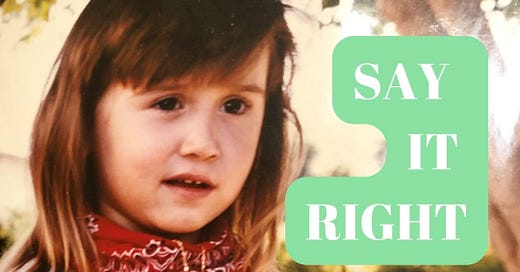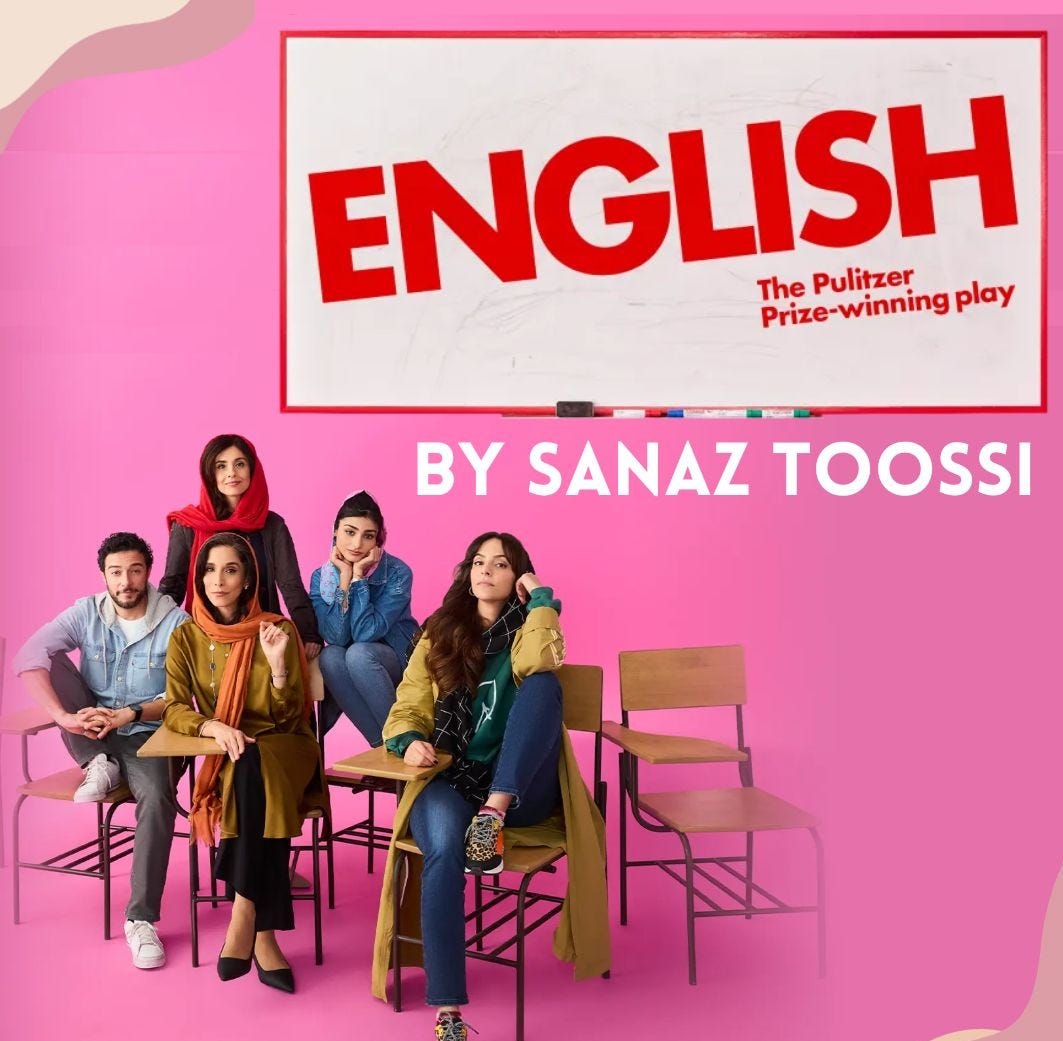Accents. Pronunciations. Inflections.
What is the correct way to say something?
School only taught me so much. Learning grammar was helpful, but beyond my first few years, I don’t recall continuing to learn what the correct pronunciation of certain words were. There were moments I became the type of person who said words out loud the way I read them in my head. The way your tongue rolls over certain letters that make the words sound different than that of your peers. Since Spanish was my first language, I definitely tried hard to emulate my peers more than I care to admit. Trying to sound just like all the other California Girls around me. When it came to blending in, how I said something felt more important than what I said. But what I wasn’t paying attention to was how much better I felt in one language over the other.
A couple of weeks ago, I saw English, a Pulitzer Prize winning play by Sanaaz Tousi on Broadway.
And before I continue, I will say YES this is a Public Service Announcement encouraging all New Yorkers to go. English runs through March 3rd.
The play centers around a rotating classroom, which encompasses four students preparing to take the TOEFL (Test of English as a Foreign Language) test in Iran, and their dedicated teacher. Throughout the course of the 1 hour and 40 minute play, we learn about the many reasons the students are preparing to take the TOEFL, and the teacher’s love of the English language. Her eyes light up as she speaks about the possibilities that seem to lie in the English language for her, while one student’s anger fires up as she feels frustration with English and wishes that the king of Persia was never defeated so that the world would be speaking Farsi. What we learn throughout is that third language that this classroom provides. A space in between the two languages, the lives that await them on the other side, and the lives they are leaving behind. And for some, the lives they’ve left behind.
The play ends with a conversation in Farsi, a language I do not speak and a conversation that isn’t translated for the English speaking audience. But the tenderness of the moment leaves you with the understanding that communicating how you feel can sometimes only be done in your native tongue.
From 2017 - 2019 I taught English as a second language in a lovely church in Washington D.C.
I had the privilege of holding space for people from all over the world to learn a little something new. I’ll admit, I wasn’t the best teacher as I didn’t really have a set curriculum that I was going off of and definitely didn’t do a great job explaining the grammar of it all. BUT! I had worksheets, games, and the energy only someone at 27 could have. In that classroom, in between our native languages and English, we found a third one. One filled with patience. Hand gestures. Laughter. Gathering. The mother from Algeria who brought her daughter in to meet me. The couple from Uzbekistan who introduced me to the beauty of a country I had never really seen depicted in Western media.
What I remember most though was being asked, after pronouncing a word, “is that right?”
An emphasis in the how things were said, rather than what.
So here we come back to that how. The inflection. The tone. The pronunciation. Yes, a lot of this has to do with survival. We want to be heard and understood. And if you're an immigrant trying to create a life in a new country, you need to be heard and understood. But if I think about it a little harder, I can’t help but think this is related to the sort of emphasis that exists in many other languages within the words we speak. The phrases we say. The emphasizing of how we feel through certain inflection points or tones in our native tongues. In a language as literal as English, it can feel hard to know what to say to evoke that same emotion.
My friends and I always joke that because English truly wasn’t our first, or for some our only, language, we still don’t really understand the idioms that exist.
Throw in the towel
Drop the ball
Soup to nuts
Full-court press
Knock it out of the park
… why are so many of them sports related?
Of course now after having played many sports growing up here as a kid and many jobs where I have had to google some phrases, I can understand what they mean to express. But even as I search through the top 50 American idioms, I still don’t find that they evoke emotion very well.
Even my name feels different in English. Jennifer.
In Spanish, I’ve always been Jenny. My entire family calls me Jenny and when I meet people whose Spanish is their only language, I find myself introducing myself as Jenny. Pronounced Yeni, of course.
I taught ESL during a time of uncertainty for many immigrants. We are in that time yet again and coincidentally, I am beginning to teach ESL again, but in New York this time. The way I feel when speaking Spanish is a feeling I want to evoke in the classroom. That yes, we may never feel the same way about the English language that we do about our native tongue, but we can live in this third language of curiosity. One where we try and learn how to be heard and misunderstood, together.
I went to a session to shadow a current teacher and understood within myself that this is the place I feel most useful. In a time when it might feel good to cope by posting on social media and reposting the hatred being spewed, I encourage you to find a space where you can be of use to others. Where your skills and energy can go towards helping and doing rather than the overwhelming information highway that social media can be.
I’m not saying I’m saving the world here, but what I want to create is a space to speak freely. To be heard. To be understood. I can’t always tell them the right words to evoke how they feel, but I can live in that third language of possibility in the classroom right along their side.
I hope you find that space for yourself too.





This reminds me of how my dad and his siblings had to teach their parents english because they learned it at school/growing up but they never had access to learning it outside of their kids.
I am not even close to fluent, yet I want to be in my lifetime. I want to hold how they speak Spanish forever because it’s like a precious part of us I don’t want to ever be lost.